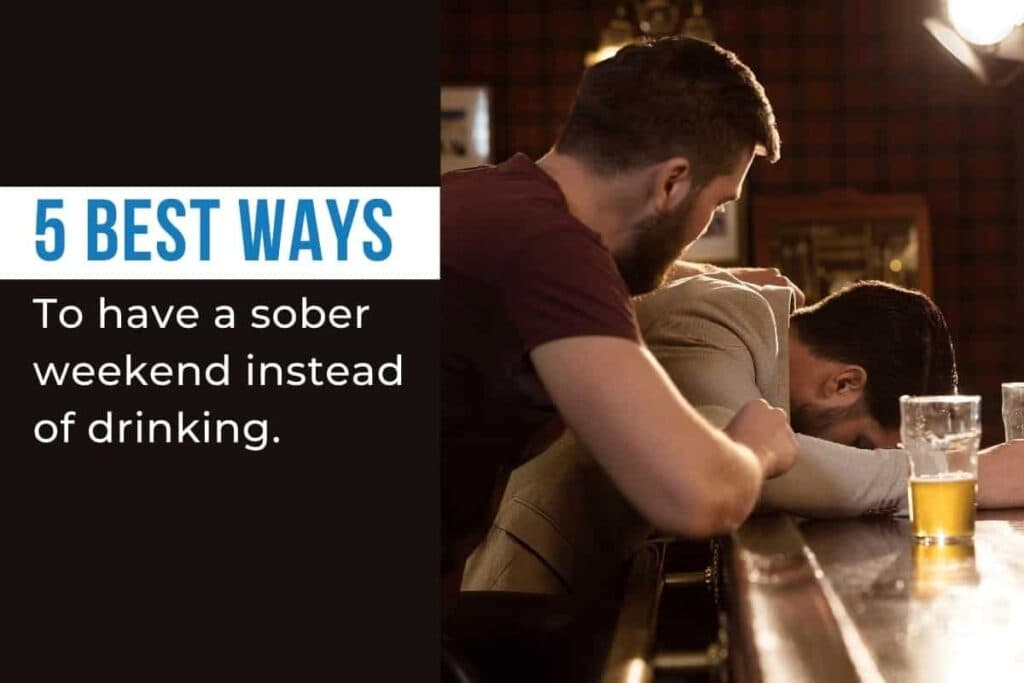These are the best ways to have a sober weekend instead of drinking.

Drinking is widely acknowledged as a social pastime, a stress-relieving pastime, and even a potential treatment for insomnia or anxiety.
However, drinking does not often alleviate these issues in the long run. It also has some substantial drawbacks if you quickly do not resort to sober weekend activities.
Even modest drinking might make you sluggish, foggy, or hungover. Other health impacts include sleep problems, gastrointestinal issues, memory troubles, increased anxiety, depression, and irritability, as well as arguments and other forms of conflict with loved ones, as well as increased anxiety, sadness, and irritability.

When the repercussions start to pile up, you might wonder whether it's time to take a vacation. More and more individuals are taking a deeper look at the role alcohol plays in their lives, from month-long sobriety challenges to practicing sober weekend activities.
These guidelines will help you make a strategy that works for you, whether you're wanting to cut back or take an extended hiatus and practice sober activities during covid
1. Plan ahead of time for difficult evenings.
We would have done it by now if relearning how to live without booze was simple. The truth is that there will be evenings when you feel uneasy and uncomfortable. Individuals who are just learning how to spend their evenings without alcohol are likely to experience the following:
- Anxiety and/or sadness may be present.
- The feeling of being bored
- Having trouble falling asleep
- Feeling cut off from night time activities centred on drinking
The phenomenon of the "pink cloud" is another trap. This is a phase early in sobriety when the brain and spirit, newly free of the depressing effects of alcohol, feel like a million bucks, all brand-new and enthusiastic about life. Because it's only a phase, it might give the recovering person the erroneous impression that life is always going to be terrific. It inadvertently blinds them to the difficulties they may encounter if they become bored or unhappy one night. It's critical to put in place defence mechanisms now for the future so that you're not navigating these triggers for the first time while suffering deeply from the issue and to avoid going to a Drug & alcohol rehabilitation centre in Ahmedabad.
2. Get rid of your alcohol
When you're attempting to stop smoking, having alcohol in your home might be tempting. If you're in the mood for a drink, knowing you'll have to go out and get anything might keep you distracted long enough to find something else to do.
Maintain a supply of non-alcoholic beverages for yourself and others. To be a good host, you don't have to provide alcohol. Allow visitors to bring their own booze, which they may keep and take with them when they leave. If you share a room with roommates, ask them to keep their alcohol hidden rather than in common areas.
3. Rekindle old hobbies.
To deal with boredom, many individuals turn to alcohol. Satisfying sober activities during covid not only keep you from drinking, but they also help you relax, which is something everyone needs. If you've lately discovered a desire to rekindle an old pastime, now is the time to do it.
Why not try something new if COVID-19 safety measures have restricted your options? Even if you can't physically engage in activities with people, technology makes it simpler than ever to acquire new skills and find unique methods to interact.
4. Make time for yourself.
It's difficult to stop drinking when you've been drinking for a long time. According to experts at Jagruti rehabilitation centre, an alcohol rehabilitation centre in Ahmedabad, when you use alcohol to cope with emotional discomfort, the extra overload might trigger the need to drink, making success much more elusive. When making major changes, it's natural to feel overwhelmed, but basic self-care habits may help you manage your emotions and take care of your mind and body.
5. Make sure you take help.
Some people find quitting alcohol on their own is more difficult than others, but there's no need to tackle it alone. Consider seeking expert help if you're having trouble sticking to your objective or just need some extra direction. Bring up your concerns with your main healthcare practitioner if you feel safe doing so. If you don't feel comfortable talking to your doctor, finding a therapist might be a good place to start.
It takes time to stop drinking, so be patient with yourself if it doesn't stick right away. Whether your ultimate aim is full abstinence or more careful drinking, you're still helping your brain and body. Jagruti rehabilitation centre is an alcohol & Drug addiction treatment centre in Ahmedabad which has experienced staff guiding many addicts about having sober activities during covid and eventually helping them stay away from alcohol. Contacting an expert for consultation might help you in the long run.








